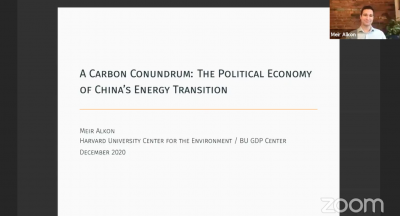China emits nearly 30 percent of the world’s carbon emissions. However, the country’s most recent five-year plan aims to become carbon neutral by 2060, which experts predict could slow global warming.

The Boston University Global Development Policy Center held a Zoom lecture Wednesday entitled “Global Markets, Domestic Reforms? The Political Economy of China’s Overseas Energy Investments” as a part of its semester-long Global China Research Colloquium.
Meir Alkon, a non-resident fellow at the Global China Initiative with the BU GDP Center, presented the lecture.
Alkon discussed how China’s international energy investments relate to the country’s ambitious goal of carbon neutrality, but said the country’s polluting practices could prevent it from reaching its goal.
“These bold international statements do contradict with the reality that we see on the ground,” Alkon said. “China continues to sponsor polluting, heavily carbon-emitting, coal-fired power plants, in much of the world.”
China has used environmental practices that contradict its goal of carbon neutrality, Alkon said, as the country continues to invest — locally and domestically — in inefficient energy sources such as coal.
“This paradox and contradiction also exists at the domestic scale,” Alkon said. “We see the rollout of wind and solar capacity, accompanied by the continued construction of carbon intensive, heavily polluting, coal-fired power.”
BU’s Frederick S. Pardee School of Global Studies professor Janine Ferretti said China exports fewer environmentally friendly technologies when giving aid to developing countries.
China’s loans often come with “strings attached,” Ferretti said, because they provide ineffective technology to these countries, making China’s investments in the developing world often unsustainable and inefficient.
“It’s been the technology that [is] less efficient,” Ferretti said, “something that wouldn’t necessarily pass muster from an environmental or efficiency standard in China. However, [it’s] being exported out to get them out of the market.”
Ferretti said China is a significant powerhouse in wind and solar energy, and is a top buyer of electric vehicles. She added that China’s technological capabilities and commitment to carbon neutrality initiatives could potentially decrease the cost of these technologies while increasing capacity and efficiency.
Zara Albright, a first-year BU doctoral student interested in studying the relationship between China and Latin America, said China’s investments in developing states build energy infrastructure that could lead to environmental harm, specifically in their coal-fired power, oil and hydropower investments.
“A lot of these projects can come with important costs for Latin American states,” Albright said. “Environmental degradation is a really strong issue right now, especially in the Amazon region.”
She added that the projects in developing countries often displace indigenous communities and are cause for other ethical concerns.
“There are concerns about labor standards and practices on a lot of these projects,” Albright said. “I think it’s a very complex role that China plays in this sector.”
During the lecture, Alkon called China’s “environmental paradox of authoritarian capitalism,” where the legitimacy of the country is improved by economic growth, but delegitimized by pollution and environmental degradation — consequences of the growth. He said this is likely the reason for the country’s carbon neutrality pledge.
“China seeks to burnish its international status and reputation as a global climate leader,” Alkon said at the event. “However, the imperatives of maintaining domestic political survival and stability in the face of this environmental paradox often push the Chinese government to use international markets as a domestic pressure valve.”
China’s desire to protect its legitimacy was likely the motivation for the carbon-neutrality pledge, but also causes situations — such as investing inefficient technology in developing countries — that undermine their energy efforts, Alkon said.
Alkon said understanding China’s energy investments requires broadening the understanding of sustainability politics.
“We have reason to imagine and believe that energy transitions and climate mitigation in authoritarian states faces real and fundamental challenges in its implementation as well,” Alkon said. “We need new frameworks to understand environmental politics that take into account the unique political economy of authoritarian capitalism context.”














